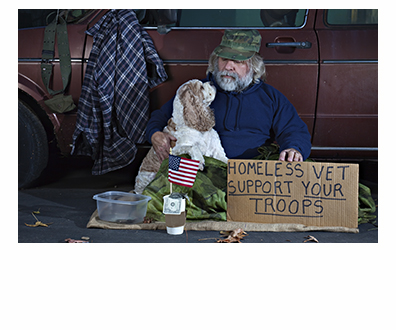Like every Nov. 11, this Veterans Day will be celebrated with parades in Portland, Waterville and other Maine communities. Those who bother to attend will hear some speeches about sacrifice by and gratitude for the people who have volunteered to serve their country, often putting the lives of others before their own.
And when the speeches are over and the bands have put away their instruments, about 125 Maine veterans will be looking for a place to spend the night.
On any day of the year, homelessness among veterans would be an appalling reminder of the hollow nature of the promises our nation has made to the people who serve it, but on the day set aside to honor veterans, it’s a national disgrace. What makes it even worse is that it’s a problem that can be solved. All it takes is will.
Although most veterans are not homeless, they are overrepresented in homeless shelters and encampments all over the country. Many say that they felt a loss of community and sense of purpose when they left the service. This is often combined with the after-effects of trauma, health problems and mental disorders that sometimes take a while to present.
The difficulty of this transition is illustrated by the high rate of suicide among returning veterans. According to a report compiled by the U.S. Department of Veterans Affairs, newly returning veterans have a suicide rate that is 42 percent higher than the general population. That does not take into account slow-motion suicides by self-destructive behavior through alcohol or drug abuse.
Add to those challenges an economic event, such as the loss of a job or a divorce, and it all too often results in homelessness.
Helping these men and women starts with finding them a place to live, but it doesn’t end there. It also requires addressing their underlying problems with resources such as mental health care, drug and alcohol treatment and job training and placement. These services need to be coordinated or progress will be short-lived.
Fortunately, there is some good news. Since President Barack Obama pledged to eliminate veteran homelessness by the end of 2015, more resources have been applied to this problem. The state of Connecticut announced this summer that chronic veteran homelessness within its borders is a thing of the past.
With federal help, the state made significant investments in permanent housing, including supported housing options for former servicemen and women who have a disability, have been homeless for a year or have experienced four separate bouts of homelessness in the last three years. Veterans who fit this description in the future will be eligible for rapid rehousing services.
Rhode Island is on the verge of making a similar announcement, and Maine can choose to join that group if we have the will.
The state has made a number of policy choices in recent years that will make joining those states more difficult. The most serious obstacles involve health care, such as the LePage administration’s decision to drop childless adults from MaineCare, and the refusal to expand MaineCare to take advantage of federal funds under the Affordable Care Act.
Thousands of veterans have lost this key constellation of services while trying to make a difficult transition in their lives.
Those policy choices make fixing this problem more difficult, but that doesn’t mean Maine has no choices.
Maine does not have to tolerate veteran homelessness, and Veterans Day is the right time to commit to ending the misery for people who already have given so much.
Send questions/comments to the editors.



Success. Please wait for the page to reload. If the page does not reload within 5 seconds, please refresh the page.
Enter your email and password to access comments.
Hi, to comment on stories you must . This profile is in addition to your subscription and website login.
Already have a commenting profile? .
Invalid username/password.
Please check your email to confirm and complete your registration.
Only subscribers are eligible to post comments. Please subscribe or login first for digital access. Here’s why.
Use the form below to reset your password. When you've submitted your account email, we will send an email with a reset code.